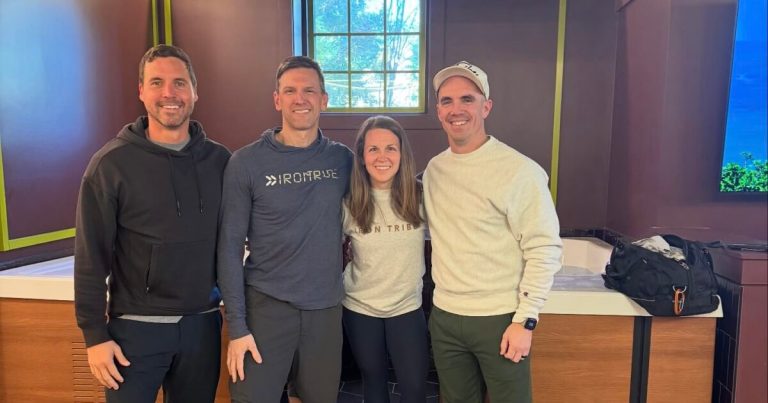How cystic fibrosis taught Chaplain Brett Vebber to comfort others as he has been comforted at Children’s of Alabama
Reading time: 5 minutes
Partnered Content

Brett Vebber looks forward to big birthdays, like turning 50, more than most. As a cystic fibrosis patient, he wasn’t expected to live past 17, much less 48, his current age. With early advanced care at Children’s of Alabama and now at UAB, he has defied the odds. Now as a chaplain at Children’s, he comforts others as he has been comforted.
Overcoming the Odds

Born in 1970 in Syracuse, New York, Vebber was diagnosed with cystic fibrosis in his first year of life. The genetic condition causes his lungs to overproduce mucus, which causes infections, scarring and decreased lung function. It also affects the pancreas and fertility.
“The doctor told my family they would need to move down South where the climate was warmer. That’s a myth, but that’s what they taught in the ’60s and ’70s. My parents picked Birmingham, which was the first cystic fibrosis research center in the United States.”
Vebber

Children’s of Alabama soon became a second home for Vebber, who would come to clinic every three months to be checked. Treatments at Children’s and at home included firm pats, or slaps, to move the mucus out.
“The doctors and nurses and all the staff really knew what pediatric care meant, and have done things along the way through the years to help me stay alive.”
Vebber
Defying medical expectations, Vebber lived to not only graduate from Shades Valley High School but also Jacksonville State University. It was in college that he became a Christian. He majored in education, then nursing and finally sociology, in which he holds a bachelor’s degree, but none of those were quite right.
The Call

After college, while on disability, he began volunteering at Children’s and discovered his love for children and the sick. He attended Birmingham Theological Seminary and earned a master’s degree in counseling.
The final piece of the puzzle fell in place 16 years ago when Doreen Duley, director of chaplain services at Children’s, asked if he’d ever thought about becoming a chaplain. Vebber has been in that role ever since.

Chaplain Services at Children’s
Children may be the patients, but in a way Children’s of Alabama treats the whole family. Doctors and nurses inform and coach families through diagnoses and treatments, while a team of nine full-time and four part-time chaplains tend to their mental, emotional and spiritual well-being.

You may have noticed a reference to 2 Corinthians 1:3-5 in the title of this article. That’s because this biblical passage is particularly important to Vebber.
The passage reads in full, “Praise be to the God and Father of our Lord Jesus Christ, the Father of compassion and the God of all comfort, who comforts us in all our troubles, so that we can comfort those in any trouble with the comfort we ourselves receive from God. For just as we share abundantly in the sufferings of Christ, so also our comfort abounds through Christ.”

How does this translate for Vebber? He has learned not to share his story as a cystic fibrosis patient in his role as chaplain. For a family dealing with a tough diagnosis of their own, that could cause an undue burden or even pain. Instead, his own experiences with cystic fibrosis give him greater empathy and help him to ask questions that others might not know to ask.
In other words, he strives to comfort others as he himself has been comforted.
Hope for Cystic Fibrosis Patients

Today, life expectancy for those with cystic fibrosis has increased from age 17 to mid-forties, which is pretty incredible. In 2000, UAB opened an adult center for cystic fibrosis patients. The need for an adult clinic is itself a testament to longer life spans.
Though Vebber still goes in for regular checks, which sometimes result in hospital stays that last weeks, he leads an active, fulfilling life with his wife and son thanks to advancements in science. It’s a future his parents would not have dared to dream in 1970.

Dr. Hector Gutierrez, director of the pulmonary division at Children’s of Alabama, as well as professor of pediatrics at UAB, shared these facts about cystic fibrosis with Bham Now.
- Nationally, the number of adult patients now outnumber pediatric patients.
- Lung function average continues to improve for both adults and pediatrics.
- The pediatric population continues to benefit from newborn screening with improved outcomes.
- The percent of patients needing a hospital stay is declining for pediatrics and stable for adults.
- Three medications that improve the underlying cause of cystic fibrosis are now available for patients with specific mutations, with the potential for 12,300 people with cystic fibrosis to benefit.
Want to learn more about how the staff at Children’s of Alabama makes a difference in the lives of patients and families? Read “11 nurses honored for excellence at Children’s of Alabama.”
Partner



 11447 views
11447 views
